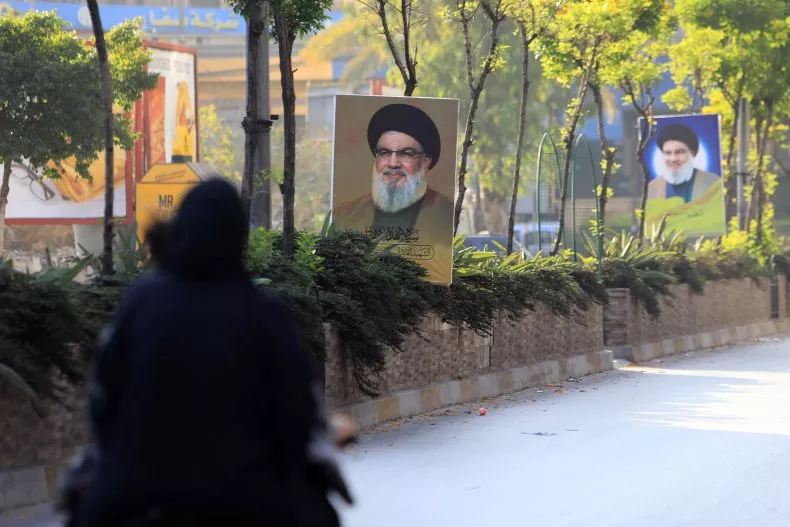
Many in the Middle East and America hailed the September 27 Israeli assassination of Hezbollah leader Hassan Nasrallah. Television stations in Israel had singing and dancing in their studios and some reporters handed out chocolate on the streets.
In time, they may come to regret these celebrations.
Hassan Nasrallah was many things, but he was a cautious and pragmatic politician at heart. He used many inflammatory words in often-fiery speeches over the years, but kept his actions restrained. He held back many of the most violent and reckless voices within Hezbollah, seeking to thread the needle of keeping up resistance against Israeli strength while avoiding anything that might invite an Israeli military response.
The day after the October 7 terrorist attack by Hamas, Hezbollah fired a limited number of rockets and artillery shells against Israeli targets “in solidarity” with the Palestinian people, 300 of whom had been killed in the first 24 hours by the Israel Defense Forces (IDF) in response to the terrorist attack. In the early days of the war against Hamas, there was concern that Hezbollah might attack the IDF, putting the latter in a two-front war. Nasrallah restrained his troops, however, and no northern front was ever opened.
In February, Nasrallah openly declared that if Israel put into effect a ceasefire in Gaza, he would stop the cross-border shelling from the north. In late July, Israel assassinated senior Hezbollah commander Fuad Shukr in Beirut. Hezbollah fired some 340 Katyusha rockets into northern Israel in retaliation, but after the barrage Nasrallah declared the action was limited and would not continue, and that he did not want a wider war. His pragmatism—resisting just enough to keep his followers happy while avoiding war with Israel—may, ironically, have cost him his life.
In a recent interview with Christiane Amanpour, Lebanese Foreign Minister Abdallah Habib claimed that in late September Nasrallah had agreed to a ceasefire with Benjamin Netanyahu. The Lebanese government claims it had confirmation from the U.S. and French governments that Netanyahu had agreed to the ceasefire—and then Nasrallah was assassinated anyway. Just days later, Israel invaded southern Lebanon.
Many in Israel apparently believed that if they took out the head of Hezbollah—along with a stunning number of other high-ranking Hezbollah leaders—the organization would be weakened or possibly even fall apart, improving Israel’s security. Those hopes are unlikely to be realized. To the contrary, based on my experience fighting insurgent foes in both Iraq and Afghanistan, the more likely result will be an increase in the threat to Israel.
Consider that Hezbollah is reported to have upwards of 150,000 missiles and rockets in its inventories, hidden throughout Lebanon in bunkers, buildings, and tunnels. Nasrallah’s pragmatism led him to engage in cross-border artillery and rocket skirmishes with Israel that were small enough to put pressure on Israel to agree to a Gaza ceasefire but not so strong as to precipitate a powerful Israeli response. Thus, he refused to unleash any major attacks.
But whoever officially replaces Nasrallah as the head of the group will be faced with this dilemma: Nasrallah didn’t use his massive missile arsenal out of fear Israel would attack heavily—but Israel attacked heavily anyway, and now he’s dead. The next leader will be under pressure to make much bigger use of Hezbollah’s arsenal. Therefore, the threat to Israel is likely higher after Nasrallah’s death, not lower.
As Americans observed in both Iraq and Afghanistan, any time you kill the leader of a militia or terror group, there is always someone else waiting in the wings. Such groups are expressly designed to survive the loss of a leader, even the top leader. Remember that al-Qaeda didn’t disintegrate after Osama bin Laden’s death, and when the terrorist Abu al-Zarqawi was killed in Iraq in 2006, his terror group eventually became the much more powerful ISIS.
Hezbollah is not going to be destroyed by the assassination of its leader, but now the group is likely to be more radical, more dangerous, and more lethal to Israel. For now, it is fighting for its life against the IDF in southern Lebanon. But if the IDF’s invasion expands into a protracted war, Israel may find Hezbollah much less willing to engage in diplomacy than before Nasrallah was killed. The devil you don’t know is sometimes worse than the one you did.
